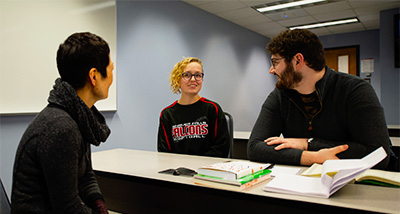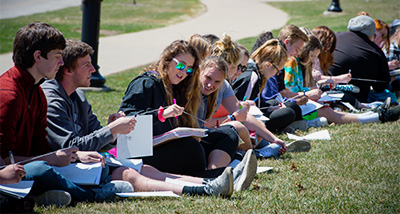
Why Study Teaching English to Speakers of Other Languages (TESOL)?
Graduate | Language/English/Education | CEBAH
There are growing numbers of English language learners across west central Wisconsin, the Twin Cities and the world. More and more often, teachers and others who work with students or employees with limited proficiency in English feel that their own training and education is inadequate to meet this challenge.
UWRF offers courses and degree plans that can prepare you to teach English to speakers of other languages (TESOL). The courses we offer are approved by the Wisconsin Department of Public Instruction (DPI) to meet licensure for teaching English as a Second Language (ESL). In addition, teachers in Minnesota may also pursue a Minnesota license upon completion of this program.
We offer multiple plan options to suit your needs:
- Master of Arts in TESOL
- Master of Arts with Teaching License
- Teaching License in TESOL
- Graduate Certificate for Professional Development
Explore below to learn more about each of our TESOL paths.
Program Details
- Individuals with a baccalaureate degree who are interested in teaching English in countries around the world.
- Individuals with a baccalaureate degree who are seeking an initial teaching license in ESL.
- Practicing teachers who want to earn a master's degree and improve their skills in working with limited English proficiency (LEP) students.
- Licensed teachers who want to add a license in ESL.
- International students who are seeking a master's degree in TESOL and an opportunity to improve their English skills while studying in the United States.
- ESL or bilingual education professionals who want to teach in Adult Basic Education (ABE) positions in Wisconsin and Minnesota.
- Learn ways to adapt teaching practices and techniques to suit ESL learners from different cultural backgrounds, age groups and language backgrounds.
- Increase sensitivity and respect for non-native cultural and language groups.
- Interact with non-native speakers in an instructional setting.
Students must meet the general admissions requirements for graduate study at UWRF. International students must have a minimum score of 80 on the Internet version of the TOEFL (Test of English as a Foreign Language) or its equivalent. See additional requirements for international students.
UWRF offers a master of arts degree in Teaching English to Speakers of Other Languages (TESOL).
This program is designed for:
- Individuals who wish to enhance their credentials for teaching in countries around the world;
- Professionals who wish to earn a master’s degree and improve their skills in working with students with limited English proficiency; and
- International students who are seeking a master’s degree in TESOL and an opportunity to improve their English skills while studying in the United States.
Program Features
- Learn to adapt teaching practices and techniques for learners from different cultures, age groups and language backgrounds.
- Acquire increased sensitivity for diverse cultural and language groups.
- Interact with native speakers and international students in an instructional setting.
- Take courses face-to-face on campus or online.
Admission Requirements
- A baccalaureate degree earned from an accredited institution.
- A grade point average of at least 2.75 (on a four-point scale) or 2.90 based on the last 60 semester or 90 quarter credits of their undergraduate program.
Students must meet the general admissions requirements for graduate study at UWRF. International students must have a minimum score of 80 on the Internet version of the TOEFL (Test of English as a Foreign Language) or its equivalent. See additional requirements for international students.
The following courses are required to complete a Master of Arts degree in Teaching English to Speakers of Other Languages (TESOL).
Foreign Language Competency
All students must demonstrate that they have studied a single foreign language for two years, which can be two years of high school study, four semesters of university study, or other equivalent.
Prerequisite or Co-requisite Courses, 6 credits
ENGL 520 Structure of English, 3 credits
ENGL 522 Acquisition of Language, 3 credits
With the approval of the Program Director, you may transfer up to nine recent graduate credits of relevant coursework from another institution.
Program Core Curriculum, 36 credits
Required Courses (30 credits)
ENGL 551 Pronunciation in Language Learning and Teaching, 3 credits
ENGL 560 Theory and Methodology of TESOL, 3 credits
ENGL 620 Pedagogical Grammar, 3 credits
ENGL 675 Assessment and Testing, 3 credits
TESL 701 Reading and Writing TESOL Research, 3 credits
TESL 720 Educational Linguistics, 3 credits
TESL 763 Words, Meaning and Vocabulary Teaching, 3 credits
TESL 765 Language and Culture, 3 credits
TESL 767 Teaching ESOL Reading, 3 credits
Plus, choose one of the following:
TESL 793 Final Research Paper, 3 credits
TESL 799 Thesis, 3 credits
Directed Electives (6 credits)
Choose two, three-credit courses from the following:
ENGL 521 The English Language: History and Culture, 3 credits
ENGL 573 Practicum (or TESL 779 Internship), 3 credits
ENGL 650 Non-Native Speakers in the Midwest, 3 credits
TESL 769 Developing Discourse and Pragmatics Teaching Materials, 3 credits
TESL 789 Topics in TESOL*, 3 credits
*May be repeated (with different topics).
UWRF allows graduate students to pursue a master of arts degree in Teaching English to Speakers of Other Languages (TESOL) and a Wisconsin ESL teaching license concurrently with many graduate courses applied to the course requirements of both academic plans.
This program is designed for:
- Individuals who wish to enhance their credentials for teaching in countries around the world;
- Individuals who wish to earn a master’s degree in TESOL and a license to teach ESL in public or private schools; and
- Licensed teachers who want to earn a master’s degree in TESOL and an additional license to work with students with limited English proficiency.
Program Features
- Meet requirements for licensure to teach ESL in Wisconsin and may meet requirements in other states.
- Learn to adapt teaching practices and techniques for learners from different cultures, age groups and language backgrounds.
- Acquire increased sensitivity for diverse cultural and language groups.
- Interact with native speakers and international students in an instructional setting.
- Take courses face-to-face on campus or online.
Admission Requirements
- A baccalaureate degree earned from an accredited institution.
- A grade point average of at least 2.75 (on a four-point scale) or 2.90 based on the last 60 semester or 90 quarter credits of their undergraduate program.
Students must meet the general admissions requirements for graduate study at UWRF. International students must have a minimum score of 80 on the Internet version of the TOEFL (Test of English as a Foreign Language) or its equivalent. See additional requirements for international students.
Program Curriculum for both Degree and License
The following requirements apply to both an ESL teaching license and a master of arts degree in Teaching English to Speakers of Other Languages (TESOL).
Foreign Language Competency
All students must demonstrate that they have studied a single foreign language for two years, which can be two years of high school study, four semesters of university study, or other equivalent.
Co-requisite Courses for Degree / Required Courses for License, 6 credits
ENGL 520 Structure of English, 3 credits
ENGL 522 Acquisition of Language, 3 credits
Required Courses for the Degree and ESL License, 18 credits
ENGL 560 Theory and Methodology of TESOL, 3 credits
ENGL 620 Pedagogical Grammar, 3 credits
ENGL 675 Assessment and Testing, 3 credits
TESL 720 Educational Linguistics, 3 credits
TESL 765 Language and Culture, 3 credits
TESL 767 Teaching ESOL Reading, 3 credits
Additional Courses Required for the Degree
Required Courses for the Degree
ENGL 551 Pronunciation in Language Learning and Teaching, 3 credits
TESL 701 Reading and Writing TESOL Research, 3 credits
TESL 763 Words, Meaning and Vocabulary Teaching, 3 credits
TESL 793 Final Research Paper or TESL 799 Thesis, 3 credits
Required Electives for the Degree
Choose two, three-credit electives from the following:
ENGL 521 English Language: History and Culture, 3 credits
ENGL 573 Practicum, 3 credits (or TESL 779 Internship), 3 credits
ENGL 650 Non-Native Speakers in the Midwest, 3 credits
TESL 769 Developing Discourse and Pragmatics Teaching Materials, 3 credits
TESL 789 Topics in TESOL, 3 credits
Courses Required for Additional ESL License
ENGL 573 Practicum, 3 credits (or TESL 779 Internship), 3 credits
TED 428 Techniques of TESOL, 3 credits
TED 475 Student Teaching, 0-6 credits*
*Teachers with English or Language Arts licenses would not need additional student teaching, whereas a science teacher would.
Courses Required for Initial ESL License
ENGL 573 Practicum, 3 credits (or TESL 779 Internship), 3 credits
TED 428 Techniques of TESOL, 3 credits
TED 475 Student Teaching, 12 credits (one semester)
TED 701 Psychology of Teaching and Learning, 3 credits
TED 706 Historical, Philosophical, and Multicultural Foundations of Education, 3 credits
TED 716 Inclusive Education for English Learners and Students with Special Needs, 3 credits
UWRF offers courses approved by the Wisconsin Department of Public Instruction (DPI) to meet licensure requirements for teaching English as a Second Language (ESL).
This program is designed for:
- Individuals seeking an initial teaching license in ESL
- Licensed teachers who want to add licensure in ESL and improve their skills in working with limited English proficiency (LEP) students.
Program Features
- Meet requirements for licensure to teach ESL in Wisconsin and may meet requirements in other states.
- Learn to adapt teaching practices and techniques for learners from different cultures, age groups and language backgrounds.
- Acquire increased sensitivity for diverse cultural and language groups.
- Interact with native speakers and international students in an instructional setting.
- Take courses face-to-face on campus or online.
Admission Requirements
- A baccalaureate degree earned from an accredited institution.
- A grade point average of at least 2.75 (on a four-point scale) or 2.90 based on the last 60 semester or 90 quarter credits of their undergraduate program.
- Foreign Language Competency: All students must demonstrate that they have studied a single foreign language for two years, which can be two years of high school study, four semesters of university study or other equivalent.
Students must meet the general admissions requirements for graduate study at UWRF. International students must have a minimum score of 80 on the Internet version of the TOEFL (Test of English as a Foreign Language) or its equivalent. See additional requirements for international students.
Requirements for Initial TESOL License
Individuals who complete the following requirements are eligible to receive an initial Wisconsin ESL teaching license. Those who plan to teach in another state should confirm requirements for licensure with the respective state department.
Required Courses (44 cr., including 12 cr. of student teaching)
ENGL 520 Structure of English, 3 credits
ENGL 522 Acquisition of Language, 3 credits
ENGL 560 Theory and Methodology of TESOL, 3 credits
ENGL 573 TESOL Tutoring: Practicum, 3 cr., or TESL 779 Internship, 3 cr.
ENGL 620 Pedagogical Grammar, 3 credits
ENGL 675 Assessment and Testing, 3 credits
TESL 720 Educational Linguistics, 3 credits
TESL 767 Teaching ESOL Reading, 3 credits
TED 428 Techniques of TESOL, 3 credits
TED 475 Student Teaching, 12 credits (one semester)
TED 701 Psychology of Teaching and Learning, 3 credits
TED 706 Historical, Philosophical and Multicultural Foundations of Education, 3 credits
TED 716 Inclusive Education for English Learners and Students with Special Needs, 3 credits
Foreign Language Competency: All students must demonstrate that they have studied a single foreign language for two years, which can be two years of high school study, four semesters of university study or other equivalent.
For more information on teaching licensing and basic skills and content area exams, see the Education Preparation Program website.
Requirements for Additional ESL License
Individuals who complete the following requirements are eligible to receive an additional Wisconsin ESL teaching license. Those who plan to teach in another state should confirm requirements for licensure with the respective state department.
Required Courses (36-42 credits)
ENGL 520 Structure of English, 3 credits
ENGL 522 Acquisition of Language, 3 credits
ENGL 560 Theory and Methodology of TESOL, 3 credits
ENGL 573 TESOL Tutoring: Practicum, 3 cr., or TESL 779 Internship, 3 cr.
ENGL 620 Pedagogical Grammar, 3 credits
ENGL 675 Assessment and Testing, 3 credits
TESL 720 Educational Linguistics, 3 credits
TESL 767 Teaching ESOL Reading, 3 credits
TED 428 Techniques of TESOL, 3 credits
TED 475 Student Teaching, 0-6 credits*
*The amount of student teaching required will depend on what type of license is held. Teachers with English or Language Arts licenses would not need additional student teaching, whereas a science teacher would.
For more information on teaching licensing and basic skills and content area exams, see the Education Preparation Program website.
The graduate certificate is designed for individuals interested in professional development in TESOL or those wanting to teach adult basic education classes in the U.S. or English as a foreign language in other countries.
Admission Requirements
Students must meet the general admissions requirements for graduate study at UWRF. International students must have a minimum score of 80 on the Internet version of the TOEFL (Test of English as a Foreign Language) or its equivalent. See additional requirements for international students.
Program Curriculum for Graduate Certificate in TESOL
A minimum of 12 credits comprising the following courses, unless a substitution is deemed advisable because of previous study.
ENGL 522 Acquisition of Language (Sp)
ENGL 560 Theory and Methodology of TESOL (F)
ENGL 620 Pedagogical Grammar* (Sp)
TESL 720 Educational Linguistics (F or Sp)
*This course has the prerequisite of the knowledge contained in 520, Structure of English, which may be obtained in a variety of ways. 520 is offered online on an as-needed basis. Alternatively, a candidate for the certificate may already possess sufficient background in the traditional grammar of English, as determined in consultation with the TESOL Graduate Director, to enable the waiving of 520.
Foreign Language Competency
All students must demonstrate that they have studied a single foreign language for two years, which can be two years of high school study, four semesters of university study, or other equivalent.
The TESOL Certificate requires a minimum of two semester’s study ordinarily, with one or two courses in the fall and two or three offered in the spring. The certificate is available completely face-to-face (f2f) on the UWRF campus or completely online over two years. It can easily be accomplished in one year if a mix of f2f and online courses are taken. If it is begun in the spring semester, it could even be achievable in one (spring) semester if a candidate is prepared and an appropriate course substitution is granted. Each course alternates over two academic years between being taught one year f2f and the next year online.
Teaching English to Speakers of Other Languages (TESOL)
debra.hare@uwrf.edu // 715-425-3557
Your Degree:
Graduate
Area of Study:
Language/English/Education

Skills and Learning Outcomes
- Learn to adapt teaching practices and techniques for learners from different cultures, age groups and language backgrounds.
- Cultivate increased sensitivity for diverse cultural and language groups.
- Strengthen language skills and ability to interact with non-native speakers in an instructional setting.
Types of Courses
- Acquisition of Language
- Assessment and Testing
- Educational Linguistics
- Non-Native Speakers in the Midwest
- Pronunciation in Language Learning and Teaching
- Structure of English
- Teaching ESOL reading
- The English Language: History and Culture
- Words, Meaning and Vocabulary Teaching




